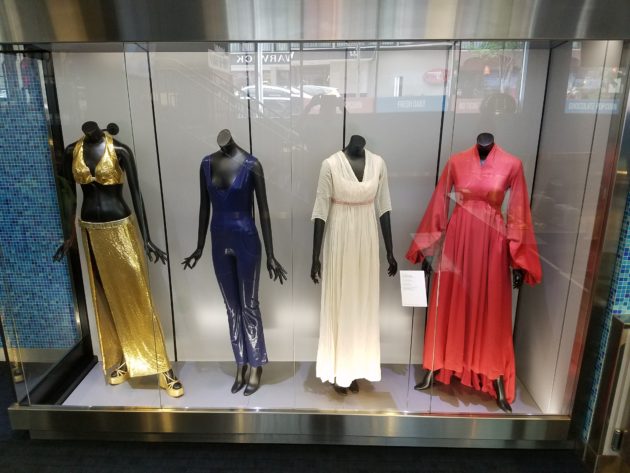
Many will remember him as the co-founder of Microsoft, or the owner of the Seattle Seahawks and Portland Trail Blazers. But Paul G. Allen had a deep and broad impact on the cultural institutions in his hometown of Seattle, as a founder, supporter, and innovator.
Allen, who died Monday at the age of 65, had an extraordinarily broad range of interests that encompassed not just sports and tech, but also science fiction, fine art, movies, music and museums. He found a way to weave them into a fabric of both institutions and events that made those interests visible, and available, to the public.
“This was one of his childhood theaters. He absolutely loves the place, and he stepped in and saved it,” recalled Ethan Caldwell, the long-time manager of Seattle Cinerama, in an interview earlier this year.
The rare theater — one of only three worldwide that can still show Cinerama-format films — was rescued from likely demolition by Allen in 1998. And made better. “Under his leadership we have seen multiple renovations to bring the theater current with industry standards, and we are currently industry leaders in projection and sound,” Caldwell told GeekWire.

Arguably the most prominent of Allen’s cultural endeavors is the curvy, Frank Gehry-designed Museum of Pop Culture (MoPOP) at the Seattle Center. Originally called Experience Music Project, largely to honor guitar legend and Allen idol Jimi Hendrix, the museum opened in 2000.
The nonprofit institution has morphed twice since, both changes expanding on Allen’s interests: first, in 2004, to add a separate Science Fiction Museum and Hall of Fame under the same roof, and a second time, in 2016, after the two emphases of the museum were combined under that roof and then given the single MoPOP name.
Visitors to both MoPOP and Cinerama see another indication of Allen’s penchant for preservation: costumes, props and other science-fiction and fantasy artifacts from the Paul G. Allen Family Collection. These have become part of various MoPOP exhibitions, and are displayed on a rotating basis in two large glass cases in the Cinerama lobby.

Cinerama’s Caldwell said visitors have two common reactions to the displays. “One, people are incredibly surprised, and confused as to why they’re here. It’s always really special for them,” he said. “And then the other is people questioning whether or not they’re real. Of course, they are.”
But popular culture isn’t the only culture that Allen supported.
Allen founded the Seattle Art Fair in 2015, which brings modern and contemporary art to the city for several days every August — including nods to technology, such as battling robots in 2018. For nearly two years, the Pivot Art + Culture gallery had rotating exhibits on South Lake Union before closing in 2017. Allen’s own fine art collection has been on display at the Seattle Art Museum, recently in the special landscape art exhibition, “Seeing Nature.”
Music, also, was a strong interest, beyond Hendrix and the original EMP. Allen was a driving force behind funding improvements to the independent Seattle radio station KEXP. He donated $500,000 to the nonprofit station two years ago, following other gifts over the years that allowed KEXP to move from the University of Washington campus and ultimately to its showcase studios at the Seattle Center.
“His involvement transformed the station,” said John Richards, KEXP morning show DJ in an on-air tribute at the time of the 2016 donation. “There would be no station without his involvement.”
And much like the Seattle Art Fair for the latest fine art, Allen founded the annual Upstream Music Fest + Summit in 2017 to highlight cutting-edge music — featuring hundreds of acts, plus a KEXP stage, in Seattle’s historic Pioneer Square neighborhood.
But just as costumes and props from a single collection are spread across more than one Allen-supported venue, Allen’s broader interests recombined in other interesting cultural ways.
Living Computers: Museum + Labs south of downtown Seattle puts technology — restored, historically significant computers — in a unique, hands-on museum in which the computers actually work. Allen himself wrote that one objective was to recognize “the efforts of those creative engineers who made some of the early breakthroughs in interactive computing that changed the world.” It opened to the general public in 2012.
“The genesis of the museum started with our founder Paul Allen when he realized that people were just throwing away old mainframes,” said Lath Carlson, Living Computers executive director in an interview last year. “They were so big and cumbersome that people just didn’t think they had any value. And so when they went out of service they were going for scrap.”
“He decided that was really probably something that shouldn’t happen and started buying up a few of them. And as is his way of doing these things, it wasn’t enough to have it. The next thing was well let’s get it running and let’s people have people use it,” Carlson said.

Allen also founded the nonprofit Flying Heritage & Combat Armor Museum at Paine Field in Everett, Wash., displaying his collection of, as the museum site puts it, “iconic armor and warbirds … many of which are the last of their kind.”
There’s more, too, including clubs for the creative industry in London and soon, Los Angeles.
There’s actually so much, now, in the Allen cultural portfolio that last year, Vulcan Arts + Entertainment was created. Its mission, it states, is to be “guided by Paul G. Allen’s vision of investing in the region’s cultural fabric so that new generations can explore and realize their true creative potential,” representing everything cultural of Allen’s tied to Vulcan from Cinerama to Upstream.
“Paul loved Seattle and the Pacific Northwest,” Chris McGowan, Vulcan Arts + Entertainment president, told GeekWire in a statement. “We are committed to continuing the impact of Paul’s efforts.”

